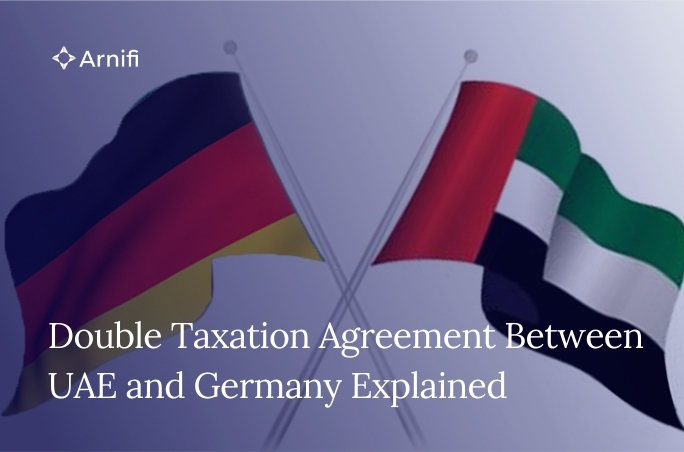Double Taxation Agreement Between UAE and Germany Explained
by Shethana Jan 24, 2025  5 MIN READ
5 MIN READ

If you are earning income between the UAE and Germany, understanding the Double Taxation Agreement is essential. This guide explains how the UAE-Germany tax treaty works, which taxes it covers, and how businesses and individuals can avoid being taxed twice on the same income.
You will learn about withholding tax rules, residency conditions, and key compliance points in 2026. Whether you are an investor, entrepreneur, or employee working across borders, this article provides clear and practical insights.
Table of contents
Double Taxation Agreement Between UAE and Germany
Preview of DTA’s between Germany & UAE
The first DTA of 1995 came into effect on August 10, 1996, which was set for 10 years. Later it was extended for a further 2 years until 2008. In December 2008 a new DTA was never signed and published. The current tax agreement between Germany and the UAE came into effect on July 14, 2011, with a term limited to 10 years. The agreement would have been extended if both countries had agreed on the extension before June 30, 2021. However, Germany decided on June 14, 2021, not to renew the agreement with the UAE. Therefore, the current DTA expired on December 31, 2021.
The current state of UAE residents in Germany
The taxation of all relevant tax assessments that have been issued by December 31, 2021, is taxed according to the current tax agreement, even if the term of the double taxation agreement has already expired. The general principle “All income is taxed in Germany if the taxpayer is resident in Germany” continues to apply.
The point of reference for this principle is the unlimited tax liability (the worldwide income would be included when calculating the amount of tax). A person is subject to unlimited income tax liability when he or she has a domicile in Germany. As for a legal entity, the domicile and management in Germany are decisive. But even if there is no unlimited tax liability. However, it may be possible that there is a limited tax liability considering domestic income.
Simplified Context – DTAs Between UAE & Germany
The double taxation agreement (DTA) between Germany and the UAE sets rules for determining tax residency. According to the agreement, a person is considered a resident of the UAE if they are domiciled in Germany and are also a UAE national. However, since UAE citizenship is required, this applies to only a small group of people. It’s important to understand how the DTA term “resident in a contracting state” relates to the local term “unlimited tax liability.” Essentially, a resident of a contracting state is someone subject to full taxation there because of their home, permanent residence, business location, or other factors.
For individuals, the following criteria are used to determine residency (in order of priority):
- Permanent residence (where you live long-term).
- Center of life interests (where your personal and economic activities are focused).
- Habitual abode (where you usually stay).
- Nationality (if none of the above provides a clear answer).
- Mutual agreement procedure (if countries cannot agree, they resolve it through discussions).
If one or more of these criteria apply, we consider the person a resident of the contracting state, bringing them under the DTA rules.
Taxes Covered Under the Agreement
The treaty generally covers the following taxes.
For Germany
– Income tax
– Corporate income tax
– Trade tax
For the UAE
– Corporate tax and other applicable federal taxes on income
This ensures that residents of either country are not subject to double taxation on the same income.
Withholding Tax Rules
The agreement sets maximum withholding tax rates on cross border payments such as dividends, interest, and royalties. These rates are generally lower than standard domestic rates. This is beneficial for investors and companies making payments between the UAE and Germany.
How Double Tax Relief Works
The agreement prevents double taxation mainly through two methods.
Exemption method
Certain income may be exempt from tax in one country if it is taxed in the other.
Credit method
Tax paid in one country can be credited against tax payable in the other country.
The applicable method depends on the type of income and treaty provisions.
Tax Residency and Permanent Establishment
To claim treaty benefits, an individual or company must qualify as a tax resident of either the UAE or Germany. The agreement also defines permanent establishment, which determines when a business becomes taxable in the other country. A permanent establishment may include a branch, office, factory, or fixed place of business.
Understanding these rules is important for businesses expanding internationally.
Who Benefits from the Treaty
The agreement benefits multinational companies, investors, employees working across borders, and entrepreneurs establishing subsidiaries. It reduces tax exposure, improves predictability, and supports economic cooperation between the UAE and Germany.
FAQs
Q) Does the UAE have a Double Taxation Agreement with Germany?
A) Yes, both countries have a bilateral treaty to prevent double taxation.
Q) What income is covered?
A) Business profits, dividends, interest, royalties, employment income, and capital gains.
Q) How can treaty benefits be claimed?
A) By providing tax residency certificates and supporting documentation.
Q) Does the treaty remove all taxes?
A) No, it prevents double taxation but does not eliminate taxes entirely.
Q) Is the agreement still relevant in 2026?
A) Yes, especially after the introduction of the UAE corporate tax.
Conclusion
The Double Taxation Agreement between the UAE and Germany plays an important role in protecting individuals and businesses from being taxed twice on the same income. Understanding how residency rules, withholding taxes, and permanent establishment provisions apply helps reduce risk and ensure compliance.
If you are planning cross-border operations or investments between the UAE and Germany, Arnifi can assist with treaty interpretation, tax structuring, and compliance. Contact us at Arnifi today for expert support and tailored guidance.
Top UAE Packages

Related Articles
Top UAE Packages



